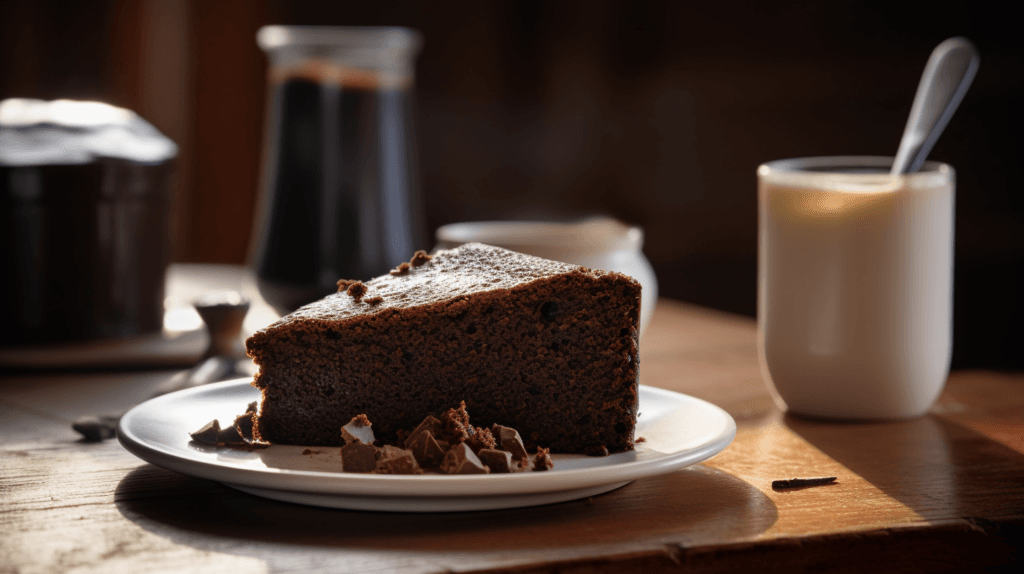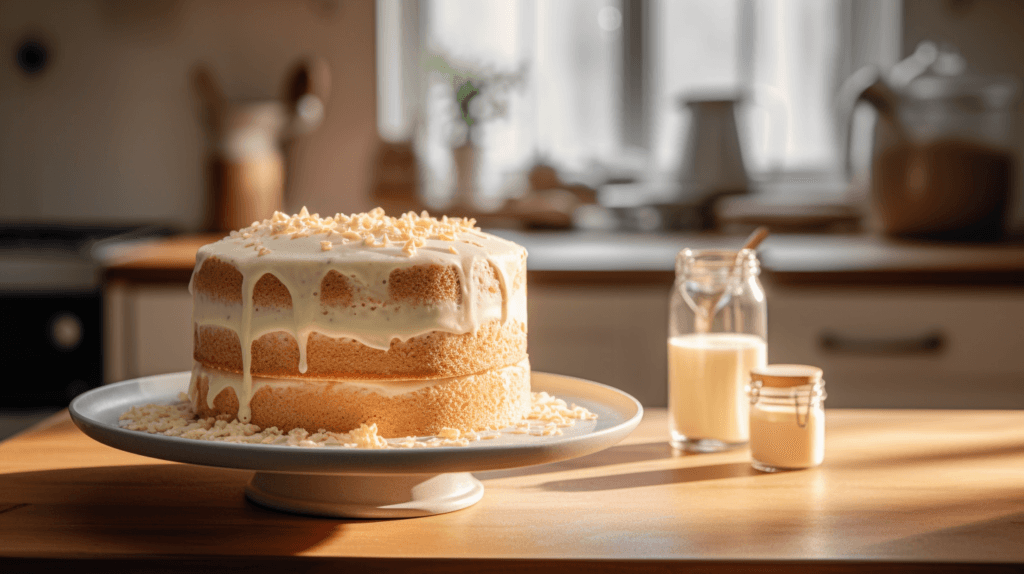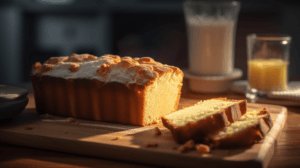Have you ever wondered if using milk instead of water could make your cake moister and tastier? The choice of liquid in baking is more important than it seems. Liquids contribute to a cake’s texture, structure, and flavor. While water is often the go-to liquid, milk offers additional benefits that elevate your cake to a whole new level. But does milk instead of water make cake moist? Absolutely. Milk’s fats, proteins, and natural sugars combine to enhance moisture retention and create a richer flavor profile.
This article delves into the science of using milk in baking, why it’s a superior choice over water, and how to incorporate it effectively into your cake recipes. By understanding the role of milk, you’ll unlock the secrets to baking cakes that are soft, moist, and irresistibly delicious.
CONTENT SUMMARY:
Table of Contents
- The Role of Liquids in Baking: Does Milk Instead of Water Make Cake Moist?
- Why Milk Instead of Water Makes Cake Moist
- How Milk Changes Cake Texture and Structure
- Flavor Enhancement: Does Milk Instead of Water Make Cake Taste Better?
- Moisture Retention and Freshness with Milk
- FAQs: Does Milk Instead of Water Make Cake Moist?
- Conclusion
The Role of Liquids in Baking: Does Milk Instead of Water Make Cake Moist?
Why Liquids Are Essential in Cake Recipes
Every cake needs a liquid to bind its ingredients and form a smooth, cohesive batter. Liquids also play a crucial role in activating leavening agents like baking powder and baking soda, which are responsible for the cake’s rise. Without liquid, the chemical reactions required for a light and fluffy cake simply wouldn’t occur.
But does milk instead of water make cake moist? Yes, because milk brings fats and proteins into the equation, both of which water lacks. Milk ensures that the batter is properly hydrated while also providing structure and richness that contribute to a tender crumb. This dual function sets milk apart as the superior choice for baking.
Comparing Water and Milk in Baking
- Water: A neutral, basic liquid that only hydrates ingredients. It lacks flavor, fat, or nutritional value.
- Milk: A nutrient-rich liquid that enhances moisture, flavor, and texture thanks to its fats, proteins, and natural sugars.
Why Milk Instead of Water Makes Cake Moist
The Moisture-Retaining Properties of Milk
Does milk instead of water make cake moist? The answer lies in milk’s fat content. Fat creates a protective barrier around the flour particles in the batter, slowing down the evaporation of water during baking. This prevents the cake from drying out and ensures a tender, soft crumb.

Additionally, the proteins in milk contribute to the structure of the cake while retaining moisture. This balance of structure and softness is critical for cakes that are both moist and well-formed. Water, by contrast, evaporates more quickly during baking, leading to a drier cake.
The Science Behind Milk’s Moisture Benefits
Milk acts as an emulsifier, meaning it helps fats and liquids mix more effectively. This even distribution ensures that moisture is retained throughout the batter, resulting in a cake that feels soft and luscious with every bite. The natural sugars in milk also caramelize slightly during baking, adding a subtle sweetness that water cannot provide.
How Milk Changes Cake Texture and Structure
Why Cakes with Milk Are Softer and Fluffier
Cakes made with milk have a softer texture because of the interactions between milk proteins and gluten. Milk proteins help control the development of gluten, ensuring that the cake’s crumb is tender rather than chewy. This creates a texture that is soft and airy, making the cake more enjoyable to eat.
Does milk instead of water make cake moist and fluffy? Yes, because milk’s natural fats and proteins contribute to a consistent rise during baking. The result is a cake that is evenly leavened and pleasantly light.
The Role of Emulsification
Milk’s emulsifying properties ensure that fats and liquids are evenly distributed throughout the batter. This leads to a more uniform texture and reduces the risk of dry spots or uneven baking. Water lacks these properties, making it a less effective choice for achieving soft, moist cakes.
Flavor Enhancement: Does Milk Instead of Water Make Cake Taste Better?
The Natural Sugars in Milk
Milk contains lactose, a natural sugar that adds a subtle sweetness to the cake. When exposed to heat, this sugar caramelizes slightly, enhancing the cake’s flavor. In contrast, water adds no flavor, leaving the cake reliant solely on other ingredients for its taste.
Complementing Other Ingredients
Milk also has a creamy, rich flavor that enhances the overall taste of the cake. This is especially noticeable in cakes that rely on vanilla, chocolate, or fruit as primary flavor components. By using milk instead of water, you create a cake with a more balanced and satisfying flavor profile.
While milk clearly improves both texture and taste, the bigger picture is how simple swaps influence daily habits. Our Nutrition and Wellness Guides explore how choices like using milk instead of water fit into balanced eating that supports energy and joy.
Want to explore more about milk flavors? Discover What Does Goat Milk Taste Like?.
Moisture Retention and Freshness with Milk
Why Cakes with Milk Stay Fresh Longer
Does milk instead of water make cake moist over time? Yes, cakes baked with milk retain their moisture for longer periods compared to those made with water. This is due to milk’s fat content, which slows down the rate of moisture loss after baking.
Cakes made with milk are ideal for occasions where they need to be baked in advance, as they stay soft and delicious even a day or two after baking.

FAQs: Does Milk Instead of Water Make Cake Moist?
1. Can I use milk in all cake recipes?
Yes, milk can be used in most cake recipes as a substitute for water. However, it’s essential to consider the type of cake and the milk you’re using. For instance, recipes for dense cakes like pound cakes or cheesecakes may require the additional fat from whole milk or buttermilk for optimal results. For light, airy cakes, such as chiffon or sponge cakes, you can use milk, but you may need to adjust other ingredients to maintain the batter’s delicate balance.
Keep in mind that milk has a different density and nutritional composition than water. If the recipe relies on water for a lighter texture, substituting milk could slightly alter the cake’s consistency. Always test with small batches if you’re unsure, or look for recipes designed with milk in mind.
2. Does milk instead of water make boxed cake mixes moist?
Absolutely! Substituting milk for water in boxed cake mixes is a simple way to elevate the texture, flavor, and overall quality of the cake. Milk introduces fats, proteins, and natural sugars that enhance moisture retention and richness. These qualities make the cake taste more homemade and less processed.
For best results, use whole milk or buttermilk in place of water. If you’re feeling adventurous, you can even mix in flavored milks, like chocolate or almond milk, to complement the cake’s flavor profile. Keep in mind that milk may slightly extend baking time due to its fat content, so check for doneness carefully. With milk, your boxed cake mix will look and taste like it came from a bakery.
3. Can I use non-dairy milk instead of water?
Yes, non-dairy milks like almond milk, coconut milk, soy milk, and oat milk are excellent substitutes for water. They add moisture while also introducing subtle flavors that can enhance the cake’s taste. For example, coconut milk lends a tropical note, while almond milk adds a nutty undertone.
When using non-dairy milk, make sure it’s unsweetened and unflavored unless the additional sweetness and flavor work well with your cake recipe. Non-dairy milks often have lower fat content than whole milk, so the results may not be as rich. However, you can improve this by adding a tablespoon of oil or melted vegan butter to the batter.
Non-dairy milk is particularly useful for those with dietary restrictions or allergies, and it works well in both vegan and non-vegan cake recipes.
4. Will using skim milk make a difference?
Yes, using skim milk can make a difference in the final texture and moisture of your cake. Skim milk lacks the fat found in whole milk, which plays a significant role in retaining moisture and creating a tender crumb. Cakes made with skim milk may still be moist but are likely to feel slightly less rich and soft compared to those made with whole milk.
To compensate for the lower fat content in skim milk, you can add one or two tablespoons of melted butter, heavy cream, or even a tablespoon of oil to the batter. This will help mimic the effect of whole milk while still keeping the calorie count lower than using full-fat dairy. Skim milk is a good option for those looking for a lighter alternative, but for the moistest cake, whole milk remains the top choice.
5. Does milk affect baking time?
Yes, milk can affect the baking time of your cake. Since milk contains fats and proteins that water lacks, it changes the way the batter reacts to heat in the oven. Cakes made with milk may take slightly longer to bake because milk adds density to the batter and slows down the evaporation of moisture.
To ensure your cake bakes evenly, keep a close eye on it during the final minutes of baking. Check for doneness by inserting a toothpick into the center of the cake. If it comes out clean or with a few crumbs, the cake is ready. Avoid opening the oven too frequently, as this can cause the cake to sink.
It’s also worth noting that cakes made with milk tend to brown more easily due to the natural sugars in milk. This browning doesn’t mean the cake is overcooked; rather, it’s an indicator of milk’s caramelization process, which enhances flavor. Adjust the oven temperature slightly lower if you want to avoid excessive browning.
Conclusion
So, does milk instead of water make cake moist? The answer is a definitive yes. Replacing water with milk in your cake recipes is one of the easiest ways to transform an ordinary cake into something extraordinary. Milk’s unique combination of fats, proteins, and natural sugars enhances every aspect of the baking process. From improving texture and retaining moisture to enriching flavor and strengthening structure, milk plays a multifaceted role that water simply cannot replicate.
Milk’s fats create a tender crumb, ensuring your cake is soft and melt-in-your-mouth delicious. Its proteins help stabilize the batter, allowing the cake to hold its shape while remaining light and fluffy. Natural sugars in milk contribute subtle sweetness and promote caramelization during baking, resulting in a beautiful golden-brown exterior that adds visual appeal and flavor depth. These elements work together harmoniously to elevate the overall quality of your cake.
Whether you’re working with a boxed mix or baking from scratch, the switch from water to milk is simple but impactful. For boxed cake mixes, the addition of milk can make the cake taste more homemade, adding a richness and creaminess that can rival scratch-made recipes. For scratch recipes, using milk instead of water allows you to achieve a more balanced flavor profile, complementing other ingredients like chocolate, vanilla, or fruit.
The benefits don’t stop at taste and texture. Cakes made with milk tend to stay fresher for longer. This makes milk an excellent choice for baking ahead of time, ensuring your cakes remain moist and delectable even after a day or two. Whether you’re baking for a celebration, a casual gathering, or just for fun, using milk instead of water ensures that your cakes leave a lasting impression.
The next time you bake, don’t hesitate to make the switch to milk. Experiment with different types of milk—such as whole milk for richness, buttermilk for extra tenderness, or even non-dairy options like almond or coconut milk for unique flavors. You’ll quickly discover how much of a difference this one change can make. By replacing water with milk, you’ll be rewarded with cakes that are irresistibly moist, flavorful, and satisfying. Baking is all about creating joy, and a cake baked with milk is sure to bring smiles with every bite.

